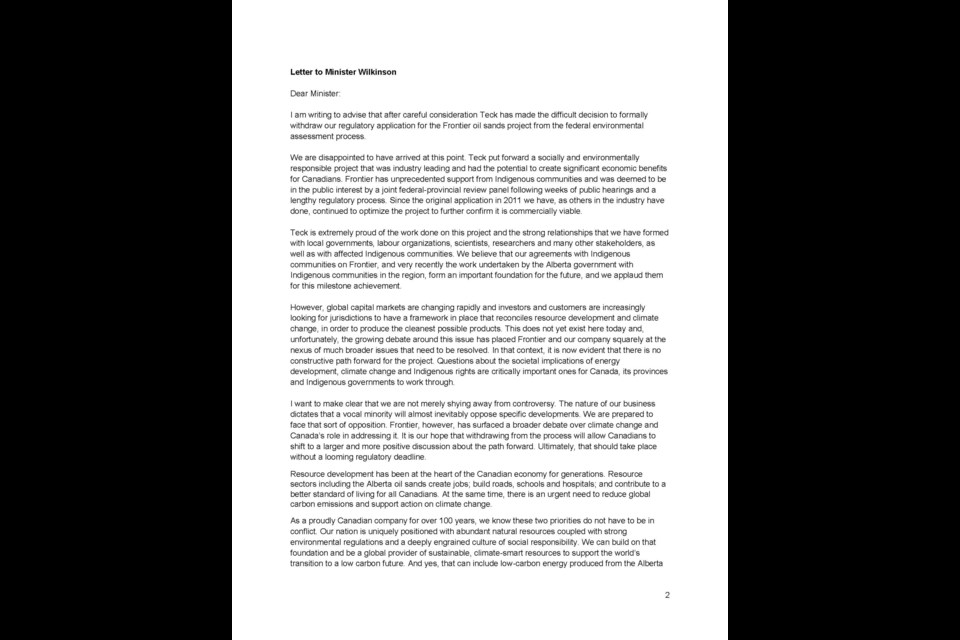Vancouver – Late in the evening of Sunday, Feb. 23, Tech Resources Limited dropped the bombshell that, just days before the federal cabinet was to decide on the approval of the company’s proposed Frontier oilsands mine, they were pulling out.
As a result, Tech will write down $1.13 billion carrying value on the Frontier project. The proposal had been worth $20.6 billion.
The cancellation of the project sent shockwaves throughout the resources sector, as well as the political sphere, as yet one more project that would not be built, by an industry that has been desperately looking for good news over the last five years. Ã˝
Here is the letter Teck president and CEO Don Lindsay sent to federal Minister of Environment and Climate Change Jonathan Wilkinson outlining their reasons for the withdrawal. We present it in its entirety
Ã˝
Dear Minister:
I am writing to advise that after careful consideration Teck has made the difficult decision to formally withdraw our regulatory application for the Frontier oil sands project from the federal environmental assessment process.
We are disappointed to have arrived at this point. Teck put forward a socially and environmentally responsible project that was industry leading and had the potential to create significant economic benefits for Canadians. Frontier has unprecedented support from Indigenous communities and was deemed to be in the public interest by a joint federal-provincial review panel following weeks of public hearings and a lengthy regulatory process. Since the original application in 2011 we have, as others in the industry have done, continued to optimize the project to further confirm it is commercially viable.
Teck is extremely proud of the work done on this project and the strong relationships that we have formed with local governments, labour organizations, scientists, researchers and many other stakeholders, as well as with affected Indigenous communities. We believe that our agreements with Indigenous communities on Frontier, and very recently the work undertaken by the Alberta government with Indigenous communities in the region, form an important foundation for the future, and we applaud them for this milestone achievement.Ã˝
However, global capital markets are changing rapidly and investors and customers are increasingly looking for jurisdictions to have a framework in place that reconciles resource development and climate change, in order to produce the cleanest possible products. This does not yet exist here today and, unfortunately, the growing debate around this issue has placed Frontier and our company squarely at the nexus of much broader issues that need to be resolved. In that context, it is now evident that there is no constructive path forward for the project. Questions about the societal implications of energy development, climate change and Indigenous rights are critically important ones for Canada, its provinces and Indigenous governments to work through.Ã˝
I want to make clear that we are not merely shying away from controversy. The nature of our business dictates that a vocal minority will almost inevitably oppose specific developments. We are prepared to face that sort of opposition. Frontier, however, has surfaced a broader debate over climate change and Canada’s role in addressing it. It is our hope that withdrawing from the process will allow Canadians to shift to a larger and more positive discussion about the path forward. Ultimately, that should take place without a looming regulatory deadline.
Resource development has been at the heart of the Canadian economy for generations. Resource sectors including the Alberta oil sands create jobs; build roads, schools and hospitals; and contribute to a better standard of living for all Canadians. At the same time, there is an urgent need to reduce global carbon emissions and support action on climate change.Ã˝
As a proudly Canadian company for over 100 years, we know these two priorities do not have to be in conflict. Our nation is uniquely positioned with abundant natural resources coupled with strong environmental regulations and a deeply engrained culture of social responsibility. We can build on that foundation and be a global provider of sustainable, climate-smart resources to support the world’s transition to a low carbon future. And yes, that can include low-carbon energy produced from the Alberta oil sands from projects like Frontier, using best-in-class technology, which would displace less environmentally and ethically sound oil sources.
At Teck, we believe deeply in the need to address climate change and believe that Canada has an important role to play globally as a responsible supplier of natural resources. We support strong actions to enable the transition to a low carbon future. We are also strong supporters of Canada’s action on carbon pricing and other climate policies such as legislated caps for oil sands emissions.
The promise of Canada’s potential will not be realized until governments can reach agreement around how climate policy considerations will be addressed in the context of future responsible energy sector development. Without clarity on this critical question, the situation that has faced Frontier will be faced by future projects and it will be very difficult to attract future investment, either domestic or foreign.
Teck has not taken this decision lightly. It is our hope that the decision to withdraw will help to create both the space and impetus needed for this critical discussion to take place for the benefit of all Canadians.
Ã˝
Sincerely,
Don Lindsay
President and Chief Executive Officer
Teck Resources Limited
Ã˝




